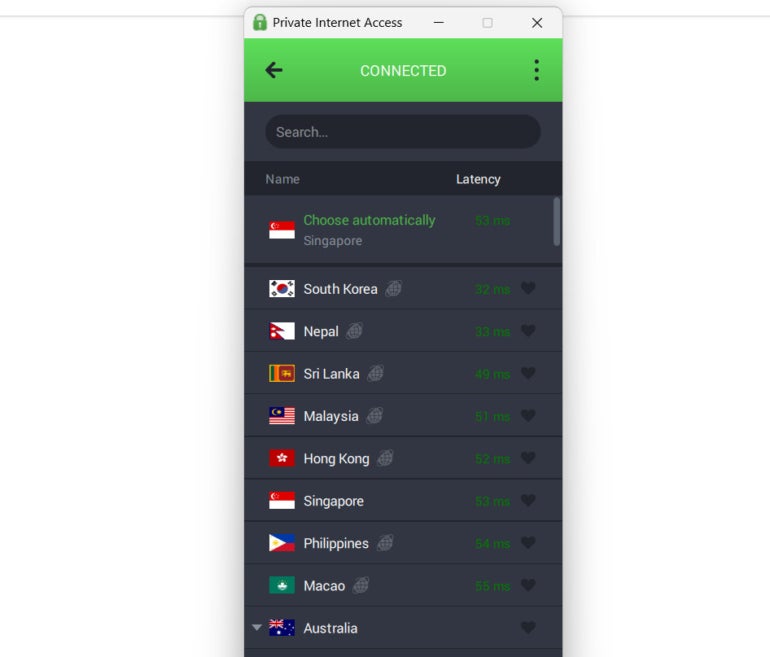
Private Internet Access Fast factsOur rating: 4.2 stars out of 5 Pricing: Starts at $3.33 (annual plan) Key features:
|
Private Internet Access has been a long-time player in the VPN space. It has a massive server fleet that spans across 91 countries and offers fast speeds through its customizable application. Supported platforms include Windows, macOS, Linux, Android, iOS, Smart TVs and routers.
While its operation in the surveillance-heavy United States may sway some users, PIA’s balance of security, speed and usability make it a strong VPN solution this year.
Jump to:
| Duration | Price |
|---|---|
| 1 year | $3.33 per month |
| 3 years (+4 months free) | $1.98 per month |
| 1 month | $11.95 per month |
| 7-day free trial | Free via Android and iOS (account can be used in desktop apps after mobile sign in) |
All three subscriptions for PIA come with the same set of features, so you won’t have to worry about missing any key features if you choose one plan over the other.
PIA VPN’s one-year subscription is the most reasonable at $3.33 per month. It slots in at the middle tier in terms of VPN pricing for a yearly plan.
The three-year plan is also very affordable at $1.98 per month, but the $2-dollar spend may not be worth it if you don’t want the three-year-long time investment. Lastly, PIA VPN’s one-month plan is more expensive than many competitors, so it’s best to go with either of the two former subscriptions instead.
Like most modern VPNs, PIA offers a 30-day money-back guarantee for the three plans. While I do wish that PIA had a full-fledged free version (which would be great for first-time VPN users), it does provide a seven-day trial through its mobile application (iOS and Android).
In my testing, I found that I could use the same account I got through the seven-day mobile free trial and then log into a desktop version of PIA using the same credentials. Having a dedicated desktop free trial is preferred, but the workaround for the free trial was painless and easy to set up.
My recommendation would be to fully utilize the seven-day mobile free trial and use it on your desktop or device of choice. This way, you get some hands-on time with the service without spending on an initial payment.
PIA VPN comes with two of the most important security protocols today: OpenVPN and WireGuard. This gives users a good balance of security (with OpenVPN) and speed (with WireGuard). It also uses 256-bit AES encryption, has a reliable kill switch and protects against DNS leaks.
With PIA VPN’s company background, there are drawbacks. First, PIA operates in the United States, which can be a red flag for users that are wary of the country’s surveillance practices. Next is PIA VPN’s ownership. Like CyberGhost VPN, it’s currently owned by Kape Technologies — which acquired PIA back in 2019.
Kape (formerly Crossrider) had been associated with distributing malware and adware before it rebranded and started moving into the cybersecurity industry. PIA itself addressed the acquisition and emphasized that the VPN service operates as a separate entity independent of Kape.
In terms of addressing security concerns, PIA VPN does have a no-logs policy, which states that it does not keep records of user IP addresses, browsing history, session timestamps and the like.
This no-logs policy has been independently confirmed and verified by Deloitte in 2022. The VPN service also utilizes RAM-only servers, which means any possible traces of user data are automatically erased upon reboot.
Lastly, the company has a public Transparency Report that outlines court orders and requests for logs. It reiterates that because the service doesn’t log any information, it doesn’t hand over any data to law enforcement.
In my opinion, while PIA’s ownership and US operations are valid concerns, the service has done enough to show that it is a safe and viable VPN service in 2023.
PIA VPN comes with both industry-standard and unique VPN features for prospective VPN buyers. Let’s take a look at some of PIA’s highlight features.
Figure A
PIA VPN offers servers spread out across 91 countries, giving users a broad range of locations to choose from. In addition, while PIA doesn’t advertise the exact server count it has, it reportedly has around 10,000 to almost 35,000 servers.
These are very impressive numbers, especially since top VPN competitors only have around 3,000-5,000 servers. The high server count will benefit users who plan on unblocking geo-restricted content or want a quality server near their location for faster speeds.
PIA also recently announced that it now has 50 servers in all 50 U.S. states.
Figure B
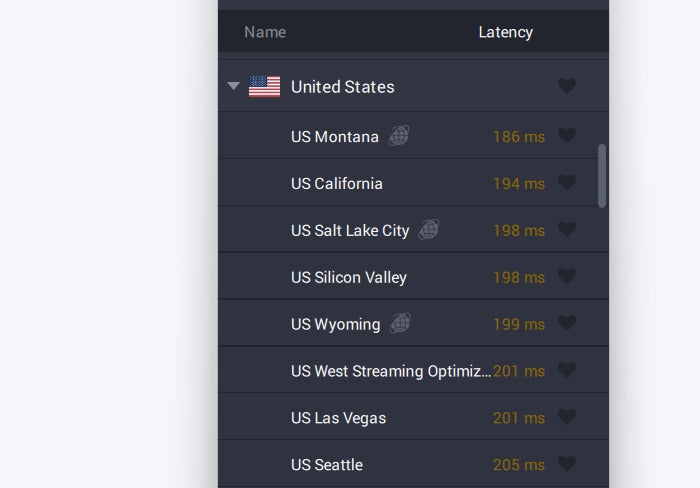
If you’re a US citizen, this is a useful value-add that will allow you to watch blocked sports or news programs or access geo-restricted accounts and services only available in specific states.
PIA allows users to customize their VPN experience in a few ways. One way is through its automation feature, which enables you to set automated actions for the VPN whenever it connects to a given network.
Figure C
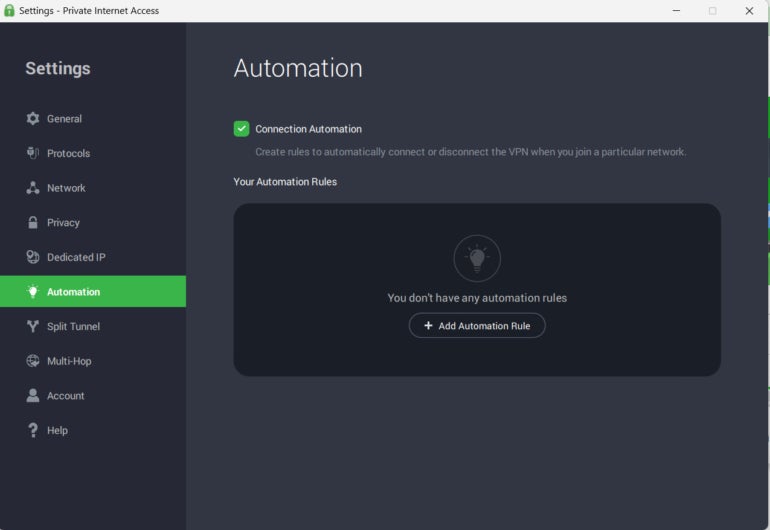
For example, you can set PIA to activate the VPN if your machine connects to an Open or unsecure network or have it turned off if you connect via an ethernet cable.
PIA VPN also enables users to bookmark or pin certain parts of the application to appear on top.
Figure D
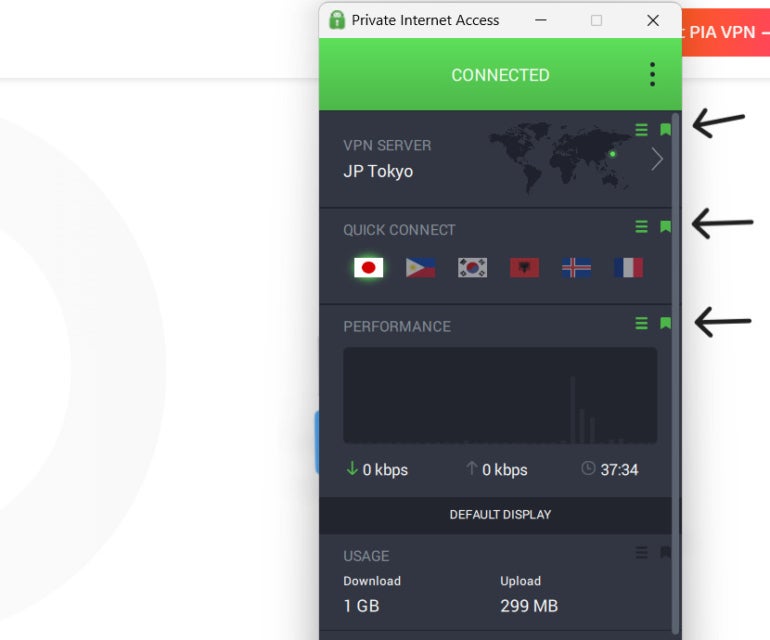
This is a simple and convenient usability feature that allows for greater customization, especially if users want to keep track of certain features or stats over others.
PIA now allows an unlimited number of simultaneous device connections with one subscription. The service formerly had a 10-device limit, and while that was in the upper range of allowed device connections, the upgrade to having unlimited connections is welcome nonetheless.
This is an underrated feature, especially for VPN users who have multiple devices for work or personal use.
Throughout my testing of PIA, I got reasonably fast speeds. I used the VPN to watch 4K and 1080p YouTube videos, attend online video conferences and do work on Google Workspace apps (Drive, Docs and Keep) — with no noticeable lag or real-world slowdown. PIA VPN also performed well in terms of download and upload speeds. In particular, the upload speed I got while using PIA was one of the lowest drops in speed I’ve recorded so far.
It also didn’t fail in terms of DNS leak protection. I ran PIA VPN through a public DNS leak tool multiple times and didn’t record any leaks after a round of tests with different servers.
For in-app performance, I found that PIA was one of the fastest VPNs I’ve used so far. In particular, it was one of the quickest in terms of switching servers and establishing new connections. Changing servers felt quick and snappy, even as I connected to locations that were farther away.
Unfortunately, I did experience one bug that keeps PIA’s performance from being perfect. The first time I switched over to the WireGuard protocol, PIA couldn’t connect to a server. This happened even if I switched to servers that were nearer my location — a stark contrast to the app’s performance while on OpenVPN. However, after restarting the application twice, the bug seemed to resolve itself and I was able to connect.
Per my research, there are a few users who have experienced a similar issue, but it does seem to be a bug that’s been fixed and is now easily resolvable.
While PIA VPN currently doesn’t provide an exact number of its server types, it has formerly declared around 10,000 to 35,000 servers. These servers are spread out across 91 countries. This number makes it one of the largest server suites available today.
Location-wise, PIA has servers in the Americas, Europe, Asia Pacific, the Middle East, Africa and Central Asia. Of note, PIA has at least one server in all 50 U.S. states — a plus if you’re a U.S. citizen looking to utilize servers in different U.S. states.
Unfortunately, PIA VPN doesn’t offer specialized servers for streaming or torrenting. It does have what it calls PIA NextGen servers. These are colocated servers wholly owned and managed by PIA that run on better, faster and more secure hardware.
Overall, it’s hard to argue against a server suite that reaches the tens and thousands, and the 50 servers for 50 U.S. states are also handy. But I do wish that PIA had more specialized server types for security, streaming or torrenting to refine its server network even more.
Private Internet Access VPN is a solid VPN choice in 2023. It has a massive server fleet, a customizable VPN app and the ability for unlimited device connections. Its 50 servers for 50 U.S. states also make it a prime choice for Americans looking for servers specific to the United States.
While its U.S. operations and parent company may cause some concern, PIA VPN gets enough things right to make it a very viable VPN option today.
While PIA VPN is a quality VPN service, it may not have the right set of features for your needs. We’ve listed similar alternatives below that may suit what you’re looking for better.
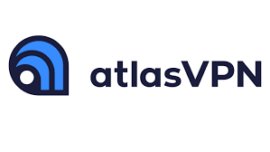
If you’re looking for an affordable VPN solution, Atlas VPN is one of the best choices. It has a unique IP-address swapping feature, unlimited device connectivity and fast speeds. It even has a full-fledged free version if you want to try a service without an initial payment.

NordVPN is one of the most well-regarded VPNs in the space. It offers consistent and fast speeds, a robust server fleet and numerous third-party audits. It also features specialized security features such as built-in malware protection and an encrypted file-sharing system that make it an all-around security platform.

Surfshark is another popular VPN option in 2023. It has an easy-to-use interface suited for beginners, strong encryption and 24/7 customer support. It also has a good reputation for unblocking streaming content.
My review of PIA VPN involved a detailed assessment of its highlight features, cost and real-world performance. I also had hands-on time with PIA through their Windows application.
For upload and download speeds, I tested PIA VPN using Ookla’s public Speedtest. Meanwhile, I ran PIA VPN through DNSLeakTest multiple times to test for DNS leaks.
Finally, I scored PIA VPN on everything from its protocols to its price based on an internal algorithm to get a rating of 4.2 out of 5 stars. This rating looked at PIA VPN both on its own and in relation to other VPN services available today.